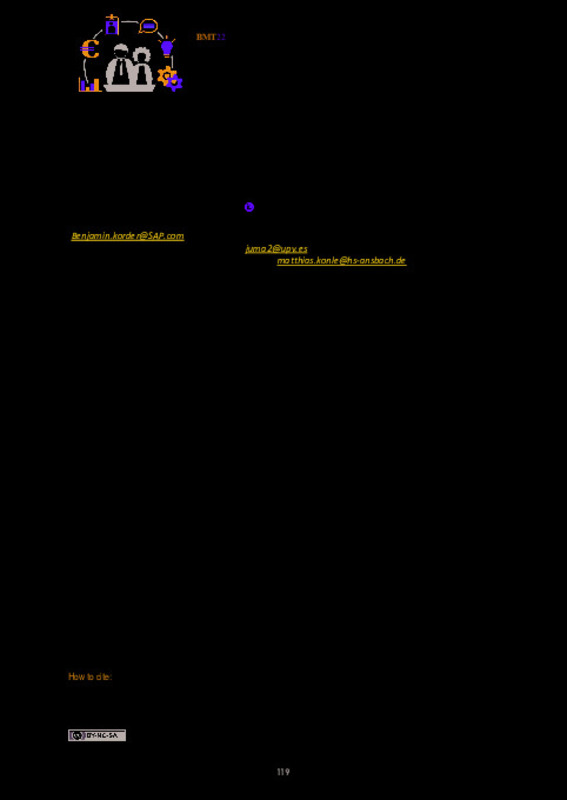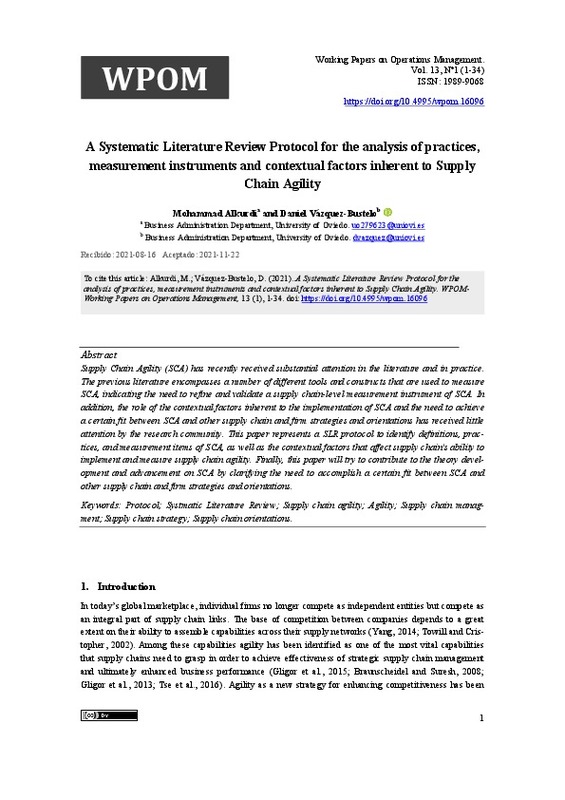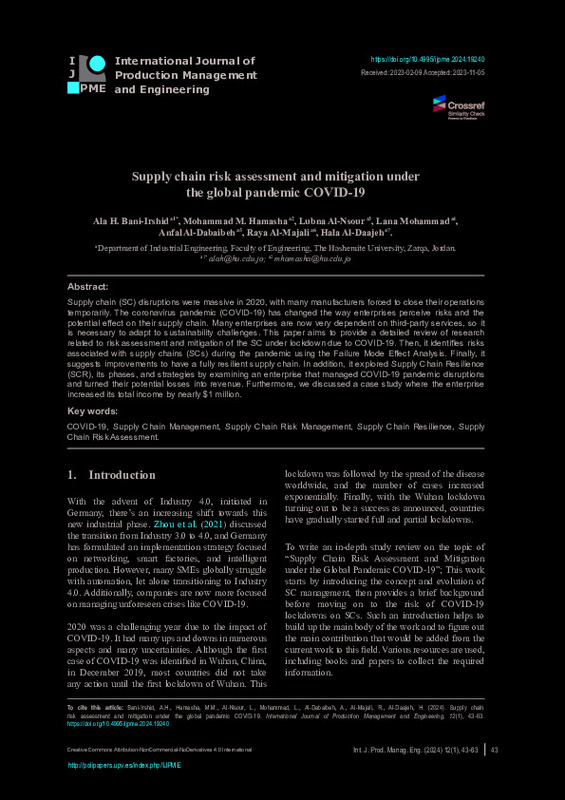JavaScript is disabled for your browser. Some features of this site may not work without it.
Buscar en RiuNet
Listar
Mi cuenta
Estadísticas
Ayuda RiuNet
Admin. UPV
Simulation Methods and Digital Strategies for Supply Chains Facing Disruptions: Insights from a Systematic Literature Review
Mostrar el registro sencillo del ítem
Ficheros en el ítem
| dc.contributor.author | Korder, Benjamin
|
es_ES |
| dc.contributor.author | Maheut, Julien
|
es_ES |
| dc.contributor.author | Konle, Matthias
|
es_ES |
| dc.date.accessioned | 2024-11-13T19:13:01Z | |
| dc.date.available | 2024-11-13T19:13:01Z | |
| dc.date.issued | 2024-07 | es_ES |
| dc.identifier.uri | http://hdl.handle.net/10251/211725 | |
| dc.description.abstract | [EN] Supply chain disruptions pose significant economic stability and growth challenges, impacting industries globally. This study aims to systematically review the literature on the use of simulation tools in managing supply chain disruptions, focusing on the historical evolution, prevalent simulation methods, specific challenges addressed, and research gaps. A systematic literature review was conducted using the PRISMA method. An initial pool of 236 articles was identified, from which 213 publications were rigorously reviewed. This study analyzed these articles to map the academic landscape, identify key clusters, and explore the integration of digital advancements in enhancing supply chain resilience. The review identified the chronological development of research in this field, highlighting significant contributions and influential authors. It was found that various simulation methods, including discrete-event simulation, agent-based modeling, and system dynamics, are employed to address different aspects of supply chain disruptions. Two primary research frontiers emerged from the analysis: the strategic reconfiguration of supply chain networks to mitigate ripple effects and the swift implementation of countermeasures to contain disruptions. The findings suggest a need for future research focusing on dynamic analysis and control theory applications to understand and manage supply chain disruptions better. This study also notes the increasing interest and need to use digital technologies (digital twins, artificial intelligence, etc.) in future research. It underscores the necessity for continued research to develop resilient and sustainable supply chain infrastructures aligned with the United Nations¿ Sustainable Development Goals. The identified research gaps offer a roadmap for future scholarly exploration and practical implementation. | es_ES |
| dc.language | Inglés | es_ES |
| dc.publisher | MDPI AG | es_ES |
| dc.relation.ispartof | Sustainability | es_ES |
| dc.rights | Reconocimiento (by) | es_ES |
| dc.subject | Supply chain management | es_ES |
| dc.subject | Supply chain network | es_ES |
| dc.subject | Supply chain resilience | es_ES |
| dc.subject | Supply chain disruption | es_ES |
| dc.subject | Ripple effect | es_ES |
| dc.subject | Simulation methods | es_ES |
| dc.subject.classification | ORGANIZACION DE EMPRESAS | es_ES |
| dc.title | Simulation Methods and Digital Strategies for Supply Chains Facing Disruptions: Insights from a Systematic Literature Review | es_ES |
| dc.type | Artículo | es_ES |
| dc.identifier.doi | 10.3390/su16145957 | es_ES |
| dc.rights.accessRights | Abierto | es_ES |
| dc.contributor.affiliation | Universitat Politècnica de València. Escuela Técnica Superior de Ingenieros Industriales - Escola Tècnica Superior d'Enginyers Industrials | es_ES |
| dc.description.bibliographicCitation | Korder, B.; Maheut, J.; Konle, M. (2024). Simulation Methods and Digital Strategies for Supply Chains Facing Disruptions: Insights from a Systematic Literature Review. Sustainability. 16(14). https://doi.org/10.3390/su16145957 | es_ES |
| dc.description.accrualMethod | S | es_ES |
| dc.relation.publisherversion | https://doi.org/10.3390/su16145957 | es_ES |
| dc.type.version | info:eu-repo/semantics/publishedVersion | es_ES |
| dc.description.volume | 16 | es_ES |
| dc.description.issue | 14 | es_ES |
| dc.identifier.eissn | 2071-1050 | es_ES |
| dc.relation.pasarela | S\522230 | es_ES |
| dc.subject.ods | 08.- Fomentar el crecimiento económico sostenido, inclusivo y sostenible, el empleo pleno y productivo, y el trabajo decente para todos | es_ES |
| dc.subject.ods | 09.- Desarrollar infraestructuras resilientes, promover la industrialización inclusiva y sostenible, y fomentar la innovación | es_ES |
| dc.subject.ods | 12.- Garantizar las pautas de consumo y de producción sostenibles | es_ES |











